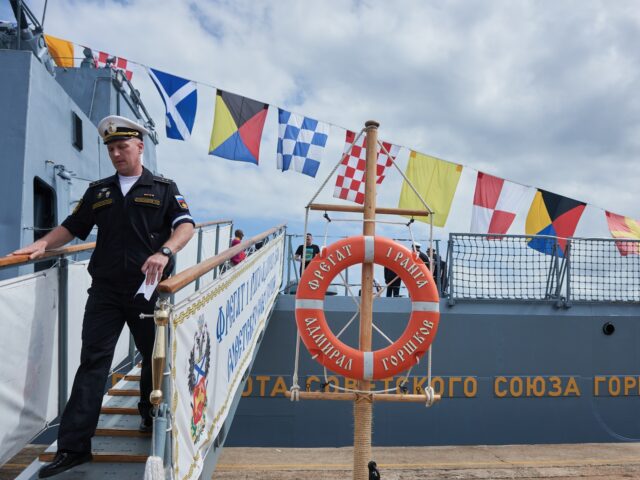The Chinese Foreign Ministry confirmed on Tuesday that military units had arrived in Vladivostok, Russia, to participate in joint military exercises with Moscow, part of a greater plan to for China to also host the Russian military in exercises in the Sea of Japan.
The Sea of Japan, or East Sea, lies between the Korean Peninsula and Japan, placing the Russian military within close proximity of a nation with which it remains technically at war. As Japan and the Soviet Union never signed a peace treaty following World War II, and the Russian Federation has also failed to formally end the war, the two nations remain the last two parties to World War II with unresolved hostilities. The major obstacle to signing a peace treaty has been a decades-long disagreement on which country should have sovereignty over the Kuril Islands, which lie between Russia and Japan and are currently occupied by Russia.
Russia and South Korea have also seen relations deteriorate dramatically in the past year over both the Russian government’s flourishing ties to North Korea and South Korea’s support for Ukraine in the ongoing invasion of that country. Russia signed a mutual defense agreement with communist North Korea in July that would, in theory, require Russian forces to enter the battle theater if North Korea were attack. North and South Korea, while not in active hostilities since 1953, are also technically in a state of war.
China is North Korea’s greatest ally and an active opponent to the Japanese government on the world stage, making the People’s Liberation Army’s (PLA) presence in the East Sea of high concern to both Seoul and Tokyo.
The Chinese state-run outlet Global Times reported on Monday that the PLA would send naval and air assets to both the East Sea and the Sea of Okhotsk to “conduct a series of joint drills and patrols in moves to deepen pragmatic military cooperation.”
Russia forces will also reportedly travel south to participate in Chinese-led exercises.
“China routinely organizes the Interaction series of exercises with Russia and joins strategic exercises organized by Russia, while the two countries also routinely hold joint naval and air patrols,” the Global Times explained. “It highlights China and Russia’s close military ties, and the two militaries’ efforts to further deepen pragmatic cooperation, a Beijing-based military expert who requested anonymity told the Global Times.”
The Chinese Defense Ministry confirmed on Tuesday that PLA forces are in Vladivostok to participate in the exercises.
“During the force projection stage, the Chinese troops successfully accomplished multiple batches of materials loading and transfer, personnel movement and ferry flights,” the Defense Ministry narrated. “As for maritime force, the Chinese participating naval taskforce reached the designated sea area at around 4:00 p.m. on Monday, and joined their Russian counterparts to prepare for the following planned exercise.”
The Ministry described the objective of the currently ongoing war games to “deepen the strategic collaboration between the two militaries, and enhance their capabilities in jointly responding to security threats.” It noted that those exercises are separate from a Russian-led exercise known as “Ocean-2024,” which is expected to take place this month.
Russian strongman Vladimir Putin. confirmed on Tuesday that Chinese forces were participating in “Ocean-2024.”
“Ships and aircraft of the Chinese People’s Liberation Army are taking parts in the drills,” Putin said, according to the Russian news agency Tass. “We focus special attention on strengthening military cooperation with friendly countries. It is especially important today, amid the growing geopolitical tension in the world.”
In remarks to the military forces participating in “Ocean-2024,” Putin emphasized that Russia “must be ready for any developments” in the defense of Russia’s “sovereignty and national interests.” The strongman added that Russian forces must be prepared to expect “any military aggression in all directions.”
The “growing geopolitical tension” that Putin mentioned on Tuesday has in many ways necessitated closer ties between Moscow and Beijing, and both Putin and Chinese dictator Xi Jinping have appeared happy to expand the number of both personal engagements and high-level meetings between their two officials. During their last in-person meeting in July, Putin declared that China-Russia relations were in “the best period in their history.” Xi appeared to agree, asserting that China and Russia “should keep upholding the original aspiration of lasting friendship and … enhance the unique value of Chinese-Russian relations.”
China has stood by the Russian government throughout its full-scale invasion of Ukraine, which began in February 2022 though Russian forces had colonized and otherwise attacked Ukrainian territory for over a decade. While China remains Ukraine’s top trade partner and claims to support a peaceful resolution to the war, its regime has actively opposed sanctions on Russia and reportedly attempted to convince other nations not to participate in a Ukrainian-led peace summit held this summer. Chinese troops have also participated in joint military exercises with Russia and Belarus near the Ukrainian border.
The North Atlantic Treaty Organization (NATO) accused China of being a “decisive enabler” of the Ukraine war in the joint statement published after its annual summit in July.
“The PRC [People’s Republic of China] cannot enable the largest war in Europe in recent history without this negatively impacting its interests and reputation,” NATO warned. Prior to the end of his term, former NATO Secretary-General Jens Stoltenberg similarly accused China of “fueling the largest armed conflict in Europe since World War II.”
The Chinese Communist Party rejected the accusations, claiming NATO was engaging in “scaremongering” and “belligerent rhetoric” to advance Western interests.

COMMENTS
Please let us know if you're having issues with commenting.